We asked LGBTQ adults whether they feel accepted by their family, friends and co-workers, and about their experiences with discrimination based on their LGBTQ identity.
Some LGBTQ adults are not out to different people in their lives. Varying shares say no one in each of the following groups knows about their sexual orientation or gender identity:
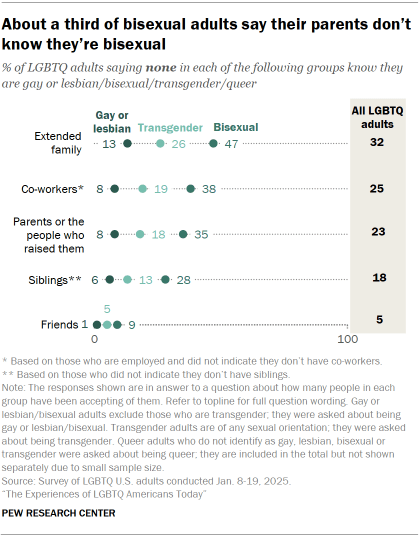
- Their extended family (32%)
- Their co-workers (25% among those with co-workers)
- Their parents or the people who raised them (23%)
- Their siblings (18% among those with siblings)
- Their friends (5%)
Bisexual adults are more likely than others to say no one in these groups knows about their identity. For example, 47% of bisexual adults say no one in their extended family knows, compared with 26% of transgender adults and 13% of gay or lesbian adults.
Acceptance by family, friends and co-workers
Parents
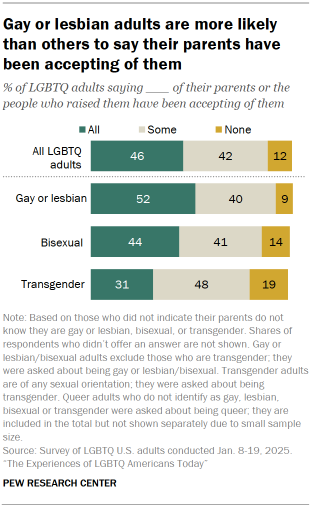
Figures for parents exclude those who say none of their parents or the people who raised them know about their identity.
Fewer than half of LGBTQ adults who are out to their parents or the people who raised them (46%) say they are all accepting. Another 42% say some have been accepting, while 12% say none of them have been accepting.
Gay or lesbian adults are the most likely – and transgender adults the least likely – to say all of their parents or the people who raised them are accepting. About half of gay or lesbian adults (52%) say this is the case, compared with 44% of bisexual adults and 31% of transgender adults.
Siblings
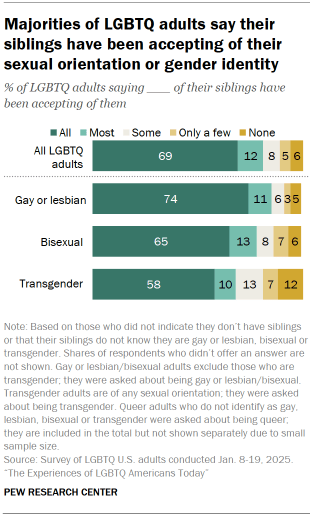
Figures for siblings exclude those who don’t have siblings and those who say none of their siblings know about their identity.
Most LGBTQ adults (69%) say all of their siblings have been accepting of them.
Again, gay or lesbian adults stand out as the most likely to say all of their siblings have been accepting (74% vs. 65% of bisexual adults and 58% of transgender adults).
Extended family
Figures for extended family exclude those who say none of their extended family know about their identity.
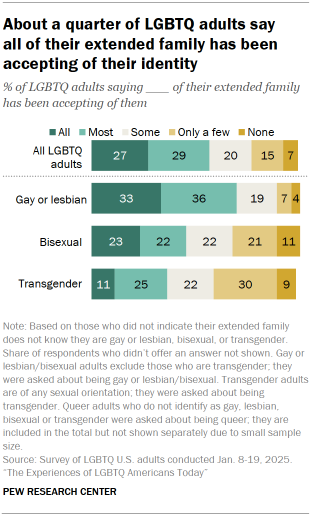
Levels of acceptance drop for extended family such as grandparents, aunts and cousins: 56% of LGBTQ adults say all or most of their extended family has been accepting of them, including 27% who say all have been.
Acceptance by extended family varies widely across groups:
- Gay or lesbian adults: 69% say all or most have been accepting, with 33% saying all have been.
- Bisexual adults: 45% say all or most, with 23% saying all.
- Transgender adults: 35% say all or most, with 11% saying all.
Friends and co-workers
Figures for friends exclude those who say none of their friends know about their identity.
Figures for co-workers exclude those who don’t have co-workers and those who say none of their co-workers know about their identity.
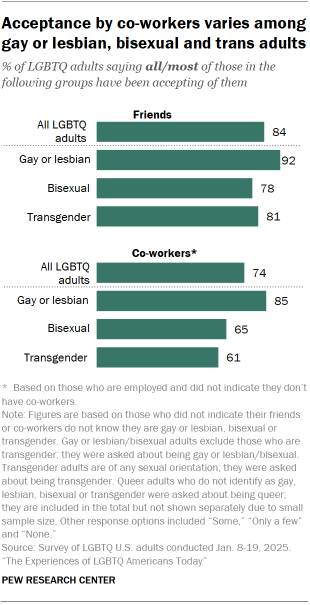
Majorities of LGBTQ adults say all or most of their friends and co-workers have been accepting.
Most (84%) say all or most of their friends have been accepting, including 61% who say all have been.
While majorities across LGBTQ groups say all or most of their friends have been accepting, gay or lesbian adults are the most likely to say this (92% vs. 81% of transgender and 78% of bisexual adults).
Experiences vary more widely when it comes to co-workers.
About three-quarters of employed LGBTQ adults (74%) say all or most of their co-workers have been accepting. Again, larger shares of gay or lesbian adults (85%) say this than bisexual (65%) and transgender adults (61%).
While majorities across groups say all or most of their co-workers have been accepting, there are stark differences in the shares saying all have been accepting:
- Gay or lesbian adults: 50%
- Bisexual adults: 45%
- Transgender adults: 24%
Experiences with discrimination
The survey also asked respondents if they have faced certain forms of discrimination because they are – or were perceived to be – gay, lesbian, bisexual or transgender.

More than half of LGBTQ adults (59%) say they have been subject to slurs and jokes, with 20% saying they experienced this in the 12 months prior to the survey.
Roughly four in-ten (41%) say they have feared for their personal safety at some point because of their LGBTQ identity. And about one-in-five or more say they have:
- Received poor service at restaurants, hotels or other places of business (24%)
- Been treated poorly by doctors, nurses or other health care professionals (21%)
- Been treated unfairly by an employer in hiring, pay or promotion (19%).
Gay or lesbian and transgender adults are more likely than bisexual adults to say they have faced each of these experiences. For example, majorities of gay or lesbian adults (73%) and transgender adults (68%) say they have been subject to slurs or jokes, compared with 47% of bisexual adults.
Transgender adults are more likely than others to say they have feared for their personal safety and have been treated poorly by health care professionals. And they are especially likely to say that each of the following has happened to them in the 12 months prior to the survey:
- Been subject to slurs or jokes (42% vs. 22% of gay or lesbian and 16% of bisexual adults)
- Feared for their personal safety (44% vs. 12% and 8%)
- Been treated poorly by health care professionals (20% vs. 5% and 4%)
- Been treated unfairly by an employer (11% vs. 4% each).
These experiences don’t vary much based on whether LGBTQ adults live in urban, suburban or rural areas.
LGBTQ men are more likely than LGBTQ women to say they have faced certain forms of discrimination. But this largely reflects the fact that men are more likely to be gay while women are more likely to be bisexual, and bisexual adults are overall less likely to report experiencing discrimination.
Navigating same-sex relationships in public spaces
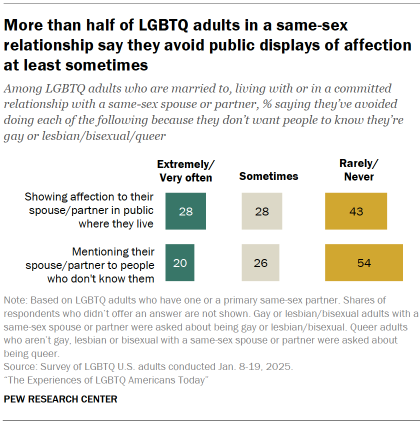
We asked LGBTQ adults who are in a same-sex relationship whether they avoid doing certain things in public because they don’t want people to know their sexual orientation.3
- 57% say they avoid showing affection to their spouse or partner in public where they live at least sometimes. This includes 28% who say they do this extremely or very often.
- 46% say they avoid mentioning their spouse or partner to people who don’t know them at least sometimes, with 20% saying they do this extremely or very often.
Those who live in urban, suburban and rural areas give similar answers on these questions.




